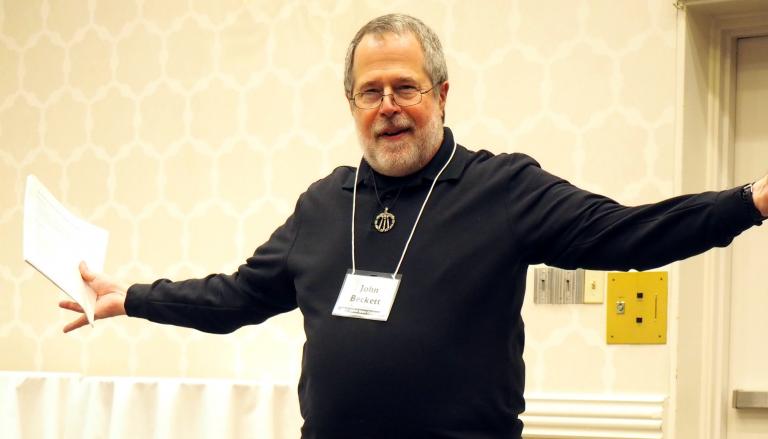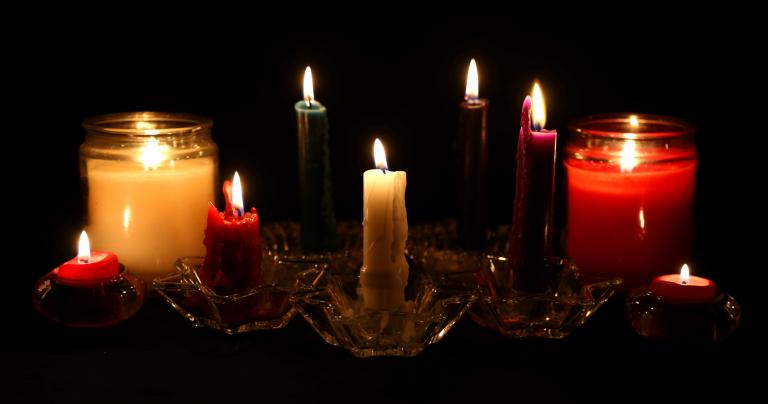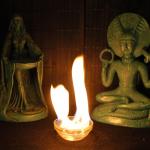At the most recent Sacred Space conference, I led a workshop titled “The Shredded Veil.” I led the same workshop last year at Pantheacon and at Mystic South. The format is pretty simple: I talk a bit about the Veil Between the Worlds and how it’s understood in modern Paganism. I share my stories of the Green Glowing Bird and the Fourknocks Fairy Dog. I speculate a bit about what might be causing this, and close with a few minutes on how we can respond.
But unlike my other presentations where I try to fill the entire time slot – with a few minutes at the end for questions and comments – when I give this presentation I leave a large block of time open for participants to tell their own stories.
I’ll be honest – I’m not comfortable handing an open mike (literally or figuratively) to someone I don’t know. I want my presentations to be orderly and on-topic, and there’s always a chance of someone going off on a tangent, or into a rant, or just going on and on and on. I’ve had that in other workshops, but interestingly, never in any of these.

In all three sessions there were more than enough stories to fill all the time available, even though almost everyone did their best to keep their stories concise – including at Sacred Space, where the timeslot was an hour and 45 minutes. In all three, people came up to me after the workshop and said “I didn’t want to share this publicly, but here’s what happened to me.”
I heard numerous stories of Otherworldly beings interacting with our world. People talked about encounters with Gods, with the dead, and with various other spirits. I heard what would best be described as ghost stories, and one that was presented as a UFO1.
I’m not going to try to tell other people’s stories. They’re not mine to tell, and that’s not the purpose of this post. Instead, I want to talk about why it’s important that we tell our own stories, and that we listen carefully when others tell theirs.
The mainstream society gaslights us
Gaslighting is a series of actions designed to make someone question their sanity. It’s a frequent tactic of domestic abusers, dictator wannabes, and other bullies. It was humorously illustrated by comedian Richard Pryor when his wife caught him in bed with another woman. He asked her “who you gonna believe, me or your lying eyes?” But gaslighting is a serious matter – it’s a form of mind control.
Our mainstream society tells us – constantly – that people who see and hear things that others don’t are mentally ill. Or they’re under the influence of drugs or alcohol. Or they’re lying “to get attention.”
But we see what we see. In June of 2016 I saw a green glowing bird. I’ll gladly entertain debate as to why that bird was glowing green, but I know what I saw. In March of 2018 I saw and heard a fairy dog – and so did six other people. Again, I’ll entertain debate that this might have been an ordinary dog that for some ordinary reason was behaving in an extraordinary way. But I know what I saw and heard.
It’s the same with our less-tangible experiences of Gods and other spirits. We’re told we’re delusional or we’re making it all up. It takes an incredible amount of will to continue insisting “I know what I experienced!” in the face of gaslighting.
Hearing other people’s stories helps normalize them. It reminds us that we’re not the only ones who experience these things. Knowing we’re not alone helps us resist the gaslighting.
Many people have mystical experiences – few talk about them
To borrow Gordon White’s term, we’re the weird kids. You would expect people at a Pagan conference to have had more mystical experiences than random people in the mall. And that’s a reasonable expectation – both scientific research and cultural studies show that people who believe in magic get better magical results.
But while we weird kids get more mystical experiences, the ordinary kids get them too, just not as many. And they don’t talk about them for fear of being ridiculed. Or they rationalize them away, because they’re convinced there’s no “rational explanation” for them and therefore they can’t be real.
But get ordinary people in a safe setting and they’ll start talking. “You know, one time I saw this thing and I was sure it wasn’t from this world.”
Or they’ll say something like “sometimes I hear my grandmother’s voice, and she’s been dead for years.”
The more we talk about our mystical and magical experiences, the more people will hear us, and the more likely they’ll be to talk about their own experiences.
And that’s a very good thing.
Disenchantment never really happened
In the 14th century Geoffrey Chaucer complained that once “all was this land fulfild of fayerye” but “now kan no man se none elves mo.” In the early 20th century Walter Yeeling Evans-Wentz collected a series of stories of encounters with the Fair Folk in the Celtic countries. Most of his subjects were older people, since younger people “pride themselves on their own exemption from ‘superstition’.”
There’s always been the idea that at some point in the past magic was much stronger and Otherworldly beings were much more prevalent than they are now. And then we turn around and see stories of magic and Otherworldly beings in our own time.
In The Myth of Disenchantment Jason Josephson-Storm provides ample historical evidence that this idea is blatantly false. People have never stopped seeing fairies. Magic may be less than it was, but it never went away.
And if it was less, I’m convinced it’s growing again. The stories coming out of “The Shredded Veil” workshops provide evidence that it is.
Regional and cultural differences matter
When I first started talking about the shredded Veil, a few people complained that I was drawing world-wide conclusions based on observations in North America. Those complaints are valid. People who’ve lived in other parts of the world (especially in South America and Asia) tell me that magic and the Otherworld (such as people there conceive of it) never stopped being strong.
One of the conversations in the Sacred Space presentation focused on how consumerism devalues anything that can’t be monetized. So what if you had an encounter with a fairy dog – that won’t pay your rent. Our emphasis on working more so we can buy more makes it hard for us to see things that aren’t either stuff or ways for us to get more stuff. Monks and mystics live lives of extreme simplicity, not because “stuff” is evil but because obsession with it distracts us from spiritual matters.
I’m a Pagan – I believe the material world and its pleasures are good, and we are right to enjoy them. But it’s a short walk from enjoying the pleasures of life to greed and obsession with money. Balancing mysticism and material abundance can be done. I’m working on it – some days I’m more successful with it than others. But American culture is highly polarized on this, with the mainstream society valuing only wealth, while most who reject it go 180 degrees in the opposite direction and argue that all material stuff is evil.
Other cultures aren’t here to be our “teachers.” But we can learn something from them if we watch and listen.
Your experiences are real – believe them!
Your eyes aren’t lying. Neither are your ears, or your skin, or those thoughts that are occurring in your brain but that you know didn’t come from you. Believe your experiences.
What happened is undeniably real. What it means is a question of interpretation. We have to practice good discernment. Sometimes a strange light is your neighbor playing with a flashlight at 3:00 AM. Go through all the rational explanations, and if one of them fits, so be it. The goal of discernment is to find the truth, not to convince ourselves we saw something we didn’t see but wish we had.
While all the stories in the workshops have been solid, I’ve heard a few privately that I had serious doubts about. I’m sure the person was telling the truth – the experience happened like they described it. But their interpretation struck me as unlikely. Jumping to Otherworldly conclusions is just as bad as dismissing Otherworldly conclusions.
But sometimes you run through all the so-called “rational explanations” and none of them fit. Sometimes the experience is so strong and speaks to us at such a deep level that – at least in the moment – there is no doubt it has a non-ordinary source. Maybe you could dismiss one strange occurrence, or two, or three… but by the time you get to six or eight or twelve, you can’t ignore the magic any longer.
Your experiences are real – believe them.
Your stories are true – tell them.
1 Some have suggested that UFOs are our modern technological society’s explanation for what previous generations would have attributed to fairies or angels. That idea has merit, but I’m reluctant to give it too much credence, because too many people who promote it are using it to reinforce a materialist worldview and dismiss the reality of Gods, spirits, and magic. Still, there may be some truth to it.


















